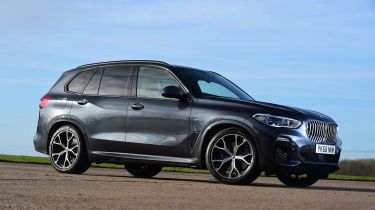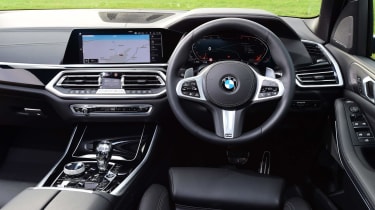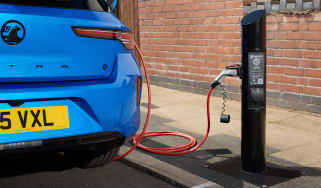Used BMW X5 (Mk4, 2018-date) review
Our full used buyer’s guide on the BMW X5 large SUV, covering the X5 Mk4 (2018-date)
Verdict
You'll need deep pockets to buy and run a BMW X5 and it's up against some very stiff competition, all of which are also worth considering. None of them appeared in our Driver Power survey this year, possibly because they're niche sellers but maybe because they didn't score highly enough, so the fact that the X5 just scraped in will put it ahead of some of those rivals, even if owners feel there's plenty of room for improvement. We're certainly big fans of BMW's family-friendly luxury SUV which is why in its 2021 Best Car Awards, CarBuyer named the X5 xDrive45 Best Large Plug-In Hybrid while the same car scooped Best Premium Plug-In Hybrid in DrivingElectric's 2020 awards. Before committing though, check out the BMW's rivals to make sure you're buying the right SUV for your needs.
When BMW launched its original X5 in 1999, it proved that it was possible to build a full-sized SUV that was as good to drive as a decent estate car. Until that point, buying an SUV meant settling for (usually significant) dynamic compromises, but not here. Maybe that's why BMW didn't call the X5 an SUV (Sports Utility Vehicle); instead it reckoned that it was a Sports Activity Vehicle.
As you would expect the newest model is the most accomplished yet. With a focus on comfort and refinement, the X5 Mk4 impresses on many levels, including performance, practicality, comfort and space. As you can tell, we love the X5, but some owners aren't convinced…
Models covered
- BMW X5 Mk4 (2018-date) - Luxurious SUV that's also great to drive.
History
The X5 Mk4 went on sale in June 2018, priced from £57,495 for the xDrive30d xLine. This featured a 261bhp 3.0-litre six-cylinder turbodiesel engine, which was also offered in 395bhp quad-turbo form in the M50d.
Used - available now
For those who preferred petrol power there was the 335bhp xDrive40i which featured a turbocharged 3.0-litre six-cylinder powerplant. By May 2019 an X5 M50i had been added to the range, powered by a turbocharged 4.4-litre V8 petrol engine.
The X5 xDrive45e plug-in hybrid that came in November 2019 packed a 282bhp 3.0-litre six-cylinder petrol engine, whereas the X5 M that arrived in April 2020 featured a 591bhp twin-turbo petrol V8, making this the most powerful X5 ever. At the same time, an xDrive40d was added to the range, with a 335bhp twin-turbo 3.0-litre diesel engine.
Which one should I buy?
All X5s came with an eight-speed automatic transmission, so it's really just a question of choosing your preferred engine and trim level.
The diesel makes a lot of sense if you do a lot of miles, but the xDrive45e has a 54-mile electric-only range, so if your daily mileage is relatively low this could be surprisingly cheap to run; predictably, the V8 petrol editions are only for those with very deep pockets.
All X5s are very well equipped, the entry-level X5 xLine having 19-inch wheels, adaptive air suspension, navigation, LED headlights, front and rear parking sensors, automatic headlights and wipers, heated front sports seats with electric adjustment, plus a powered tailgate.
Buy an X5 M Sport and you'll get 20in alloys instead, black exterior trim instead of chrome, a black headlining and run-flat tyres.
Alternatives to the BMW X5
The X5 is superb dynamically, and if this is important to you, take a look at the Porsche Cayenne because it's the best car in its class to drive. Despite this it's very practical and made to a very impressive standard.
The Volvo XC90 puts more of an emphasis on practicality, with its roomy and luxurious seven-seat interior; as you'd expect, this full-size SUV is crammed with safety tech.
If ultimate practicality isn't all that important to you, the BMW X6 might suit because it's just as good to drive, just as well made and just easy to live with. The Range Rover Sport looks smart, has a lovely interior and is great to drive, but its reliability record isn't great.
We'd also consider the Audi Q7, Mercedes GLE and the Land Rover Discovery.
What to look for
Codename
The original BMW X5 was codenamed E53 by BMW, while its successor was the E70. The third-generation X5 was the F15, and the model that we're covering here was codenamed G05.
Towing
How much you can tow varies significantly depending on which engine is fitted. The original xDrive30d can tow 1,900kg for example, other models are rated at 2,700kg, some at 3,500kg.
Spare wheel
No X5 came with a spare wheel, although there is a well into which you can fit one bought separately. Depending on which wheels were fitted, some X5s came with run-flat tyres, others with a repair kit.
Mild-hybrid tech
From summer 2020 the xDrive30d and 40i were fitted with mild hybrid technology (MHT) to reduce emissions and improve economy. The xDrive40d featured this tech from its introduction.
Interior
BMW has long been renowned for its class-leading interiors in terms of the ergonomics and the quality. It's no different here, and as you'd expect there's plenty of cabin space for five adults too.
Five seats were standard with a third row of seats optional thoughout the range; in seven-seat form the rearmost seats are too cramped for adults to travel in comfort. Boot space is impressive at 645 litres seats-up; drop them (they split 40/20/40) and this jumps to 1,860 litres.
Prices
Check out the latest used prices for the BMW X5 on our Find a Car service.
Running costs
BMW uses a system called Condition-Based Servicing for all of its cars. It's a variable-servicing programme which tells the driver when maintenance is required, based on oil levels, wear rates of individual components and how hard the vehicle is driven.
With normal driving, an oil service is due on a diesel-engined X5 every 16,000 miles. Because parts are replaced when necessary rather than according to a set schedule, there are no fixed prices for the services, but as a rule of thumb you'll pay £350-£435 (depending on which engine is fitted) for an oil and filter change.
Also replace the air and fuel filters and this cost jumps to £559-£830, while fresh brake fluid is required after three years and then every other year, at £128-£140. Lifetime coolant is used and all X5 engines are chain-driven, so there are no cambelts to replace.
Recalls
The X5 Mk4 has been recalled seven times so far, the first in March 2019 because of poorly secured front seats; 11 cars were affected. Just one car was affected by the recalls that BMW issued in July 2019 and July 2020. The first of these was because of insufficiently tight wheel bolts, the other was down to a faulty steering shaft.
Loose starter motor bolts led to the fourth recall, in August 2020 (11 cars were affected), then in October 2020, plug-in hybrids were recalled in December 2020 because the battery pack could short circuit. a month later these were recalled again for the fitment of an additional crash pad behind the auxiliary battery. Poorly made brake components led to the most recent recall, in February 2021.
Driver Power ownership satisfaction
The X5 Mk4 made its Driver Power debut in the 2021 new car survey, in 70th place out of 75 entries; BMW came a very disappointing 27th out of 30 companies in our 2020 Brands survey.
Showing just how high expectations are at this level, the X5 managed just one top 40 place out of all the categories (39th for oddments space); the X5 was near the bottom for reliability, running costs, infotainment, styling, seat comfort, ride comfort and overall quality.










